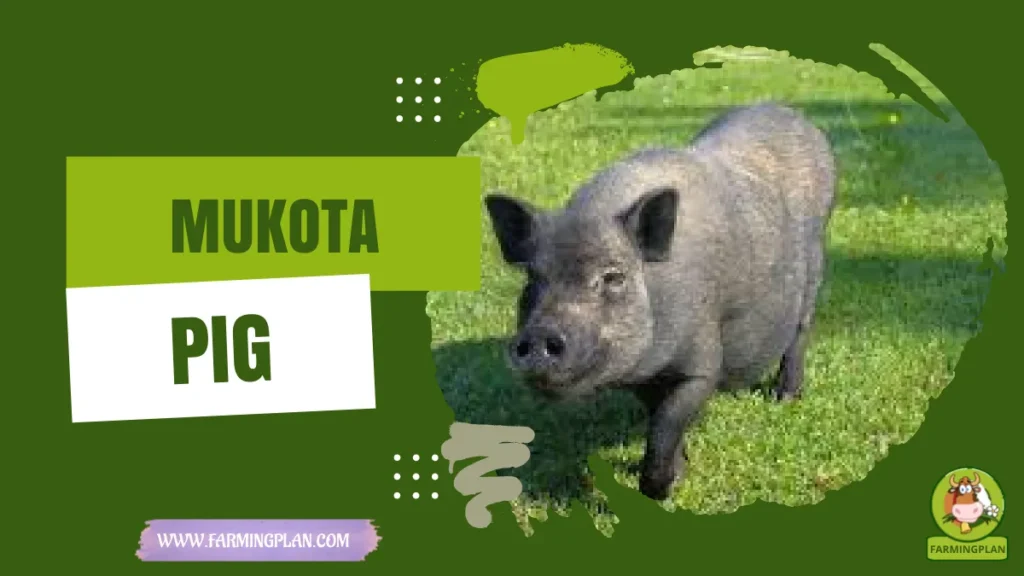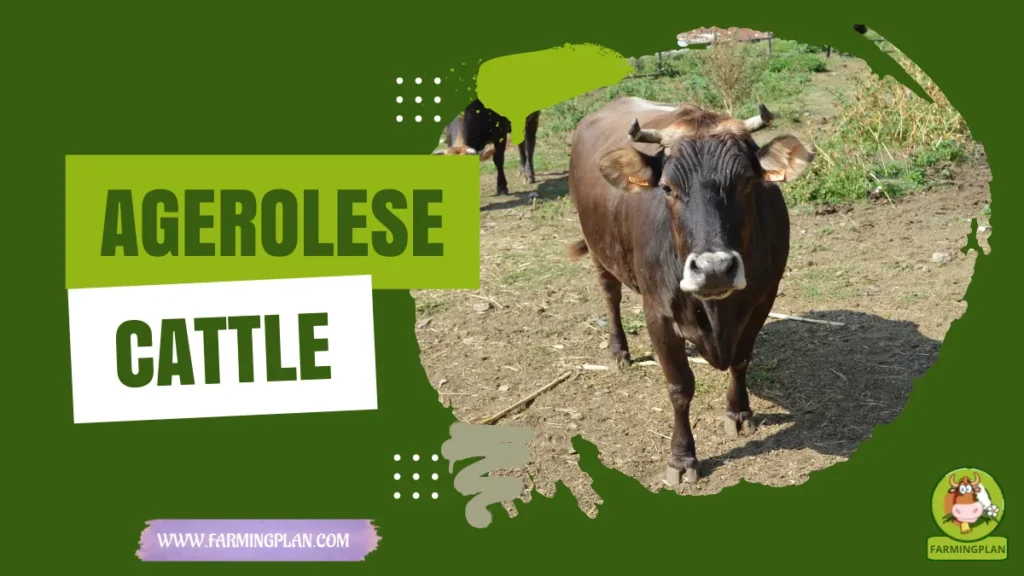The distinctive features of Jacob Sheep might make them a perfect addition to your herd, if you’re considering more unique animals. Unlike most sheep, these creatures are remarkable; their history is filled with legends and their appearances are special. Many farmers, breeders and hobbyists love this Sheep for their unique markings and the rarity of having multiple horns. No matter if you’re hoping to grow your farm, wondering about their cool traits or just love rare breeds, this article tells you everything you need to know about these strong and easy-care animals. We’ll get into the background, important qualities and all the reasons Jacob Sheep are really special.
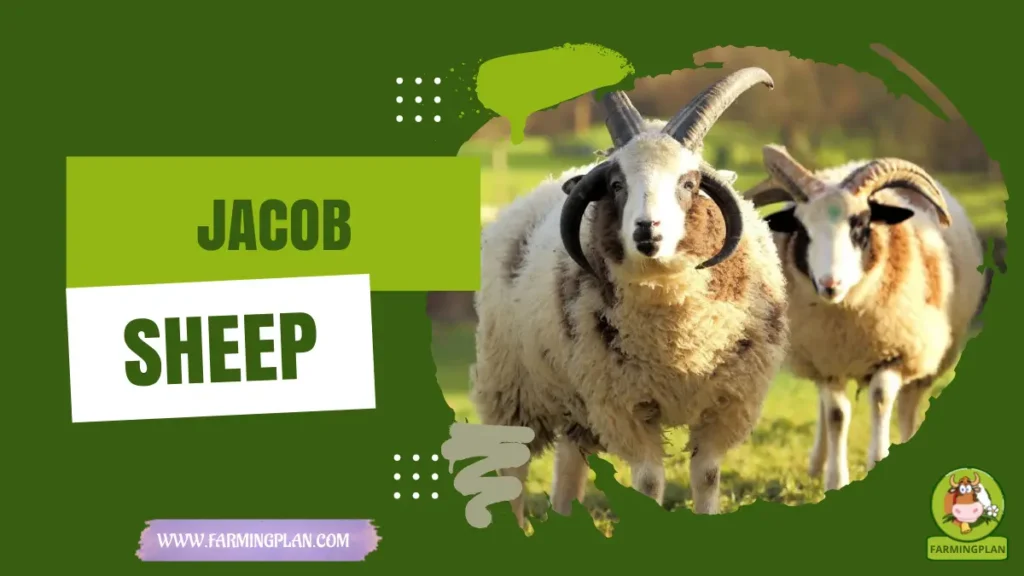
History & Origin: The Ancient Roots of Jacob Sheep
Jacob Sheep have lived on Earth for thousands of years. A lot of people think the sheep is mentioned in the Bible, where it is linked to the figure of Jacob. It’s believed that these sheep started in the Middle East, mostly around North Africa, where early sheep were first domesticated. A few scientists believe that this Sheep are descendants of Moorish sheep and Norse sheep which adds an air of mystery to how they started.

It’s even more interesting that they almost completely disappeared from farming. Thanks to organizations like the Jacob Sheep Conservancy, these animals have survived and are doing well today. They were first introduced in the United States in the early 1900s, but attention to their rarity only grew in the 1970s. For a long while, this Sheep have shown they are adaptable and still popular.
Characteristics
Jacob Sheep single themselves out because of how they look and act. Their most unusual characteristic is their horns in various places on their heads. Most of the time, sheep have just two horns, but this Sheep can have anywhere from two to four and, rarely, even six or eight. As a result, they have a look all their own and are distinct from most other breeds of sheep.

Another way to notice the difference is by looking at their coat. Their wool consists of black patches on a white background. Because the markings can be quite different, no two Jacob Sheep look exactly the same. Because of its medium-fine-grade, wool is valued by those who weave or spin yarn by hand. Both the black and white variety of their thick double-coated fur help them adapt to chilly and rough conditions. Both the four-horned ram and the two-horned ewe are so unique that you can’t miss Jacob Sheep.
Read More: Beltex Sheep: The Powerhouse Breed Every Farmer Loves
Nature & Temperament: Calm and Hardy
Jacob Sheep are known for their hardy nature and calm temperament. These animals are extremely well-suited for both farm life and ornamental purposes. Unlike some other breeds, Jacob Sheep are relatively low-maintenance. Whether in cloudy Northern Europe or hot parts of North America, they do well in a variety of climates. In reality, they are renowned for being able to handle tough climate changes more effectively than many sheep.
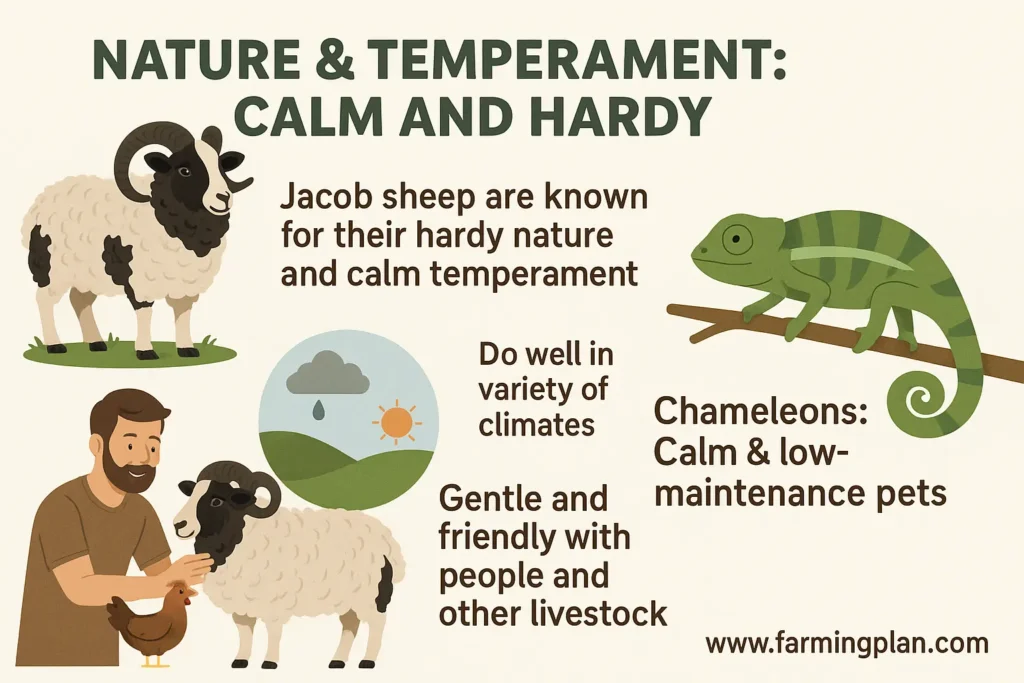
These sheep act gently and are quite friendly with people. They usually get along with fellow birds and can be kept together with other livestock without problems. Humans who want a special pet that isn’t too high-maintenance might find chameleons interesting. Although they look unusual, you might be surprised by how calm and trusting they usually are.
Food & Diet: Keeping Your Jacob Sheep Healthy
Good nutrition is key for the healthy and happy life of your Jacob Sheep. Mostly, these animals eat grass and other greens found in cattle pastures. Still, it’s necessary to choose foods that support their individual nutritional requirements. During the Winter, when the grass passes are thin, hay and grains should be given to the animals.
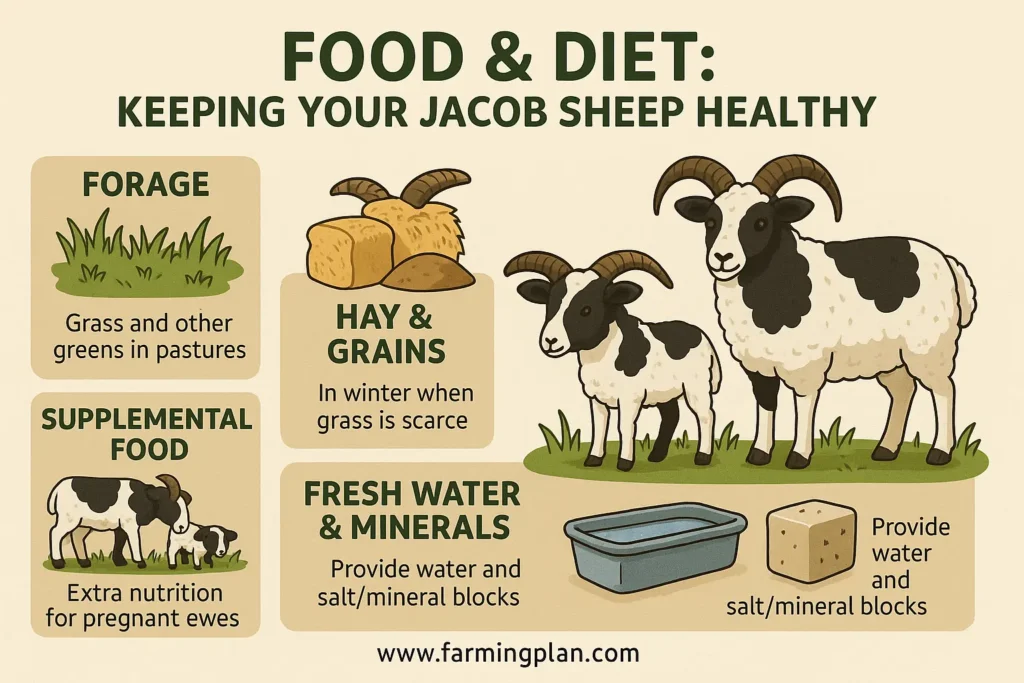
Since there will not be enough nutrients for a sheep or her lamb from grazing alone, extra supplemental food may be required during pregnancy. You should always give your sheep access to fresh water, just like you would any other breed. And make sure to use mineral supplements as well. As sheep raised in drier areas often need more minerals, adding salt and mineral blocks to their diet is a good idea.
Usage/Purpose: Why You Should Consider Jacob Sheep
Because of their versatility, Jacob Sheep make an excellent choice for any farmer, offering a unique combination of qualities. Primarily raised for their fleece, Jacob Sheep are valued for their wool, which is both soft and durable. Available in striking black and white colors, their wool is perfect for hand spinning, knitting, or quilting. Textile artists particularly appreciate the high-quality material, as it adds a distinct texture and aesthetic to any project. Whether you’re crafting warm garments or decorative items, Jacob Sheep provide a valuable resource for a wide range of creative needs.
They can also be kept for meat purposes, in addition to their wool. Pork is healthy for many due to its lean phones and can reduce the amount of saturated fat they consume. Even so, many keep Jacob Sheep simply to show their special features at fairs or to use them as pets. Many animal enthusiasts and breeders prefer these sheep since they have a recognizable look and behave easily.
Read More: Texel Sheep: The Secret to High-Yield Lambs and Quality
Special Features: Jacob Sheep’s Unique Strengths
Jacob Sheep are outstanding due to unique traits they have in appearance and behavior. They are well known for having many horns on their head. Whether there are two or six horns on a Jacob Sheep doesn’t really matter, since they all stand out. This trait makes them different from nearly all the other kinds of sheep.
Jacob Sheep are known for having a special kind of coat known as piebald which blends black and white wool. While each sheep has different coloring, their unique look is right away noticeable. Due to their thick, medium-fine wool, they are valued for producing it for spinning or crafting. No matter if you use Jacob Sheep for farming, wool or ornamental purposes, they combine great looks with usefulness.
Read More: Columbia Sheep: First Breed in the United States
Health Issues & Prevention
Like all livestock, Jacob Sheep are susceptible to certain health issues. One of the most common concerns is parasitic infections, particularly from worms or lice. Keeping their living space clean and regularly deworming your sheep can help prevent these issues. Regular hoof trimming is also important, as untrimmed hooves can lead to discomfort or infections, especially in wet conditions.
In terms of disease prevention, it’s important to keep up with vaccinations, particularly for common sheep ailments such as Bluetongue and Foot and Mouth disease. Pregnant ewes should also be monitored closely to prevent complications during lambing. With proper care and attention, this Sheep can live healthy, happy lives with minimal health issues.
“Jacob Sheep Combine Beauty, Function, And Versatility Making Them A Perfect Addition To Your Flock!”
Step-by-Step Farming Guide
Raising Jacob Sheep can be a rewarding experience. If you’re new to sheep farming or looking to expand your flock, here’s a step-by-step guide to getting started with this Sheep:
Step 1: Setting Up Your Flock
Begin by deciding where you’ll keep your Jacob Sheep. Ideally, they need a large pasture with access to fresh grass and hay. Make sure your fencing is sturdy these animals can be quite curious and will test the boundaries.
Step 2: Feeding and Maintenance
Ensure your sheep have access to fresh water at all times. Supplement their diet with quality hay and grains, especially in winter. Monitor their condition closely, especially during pregnancy and lambing seasons, and provide any necessary additional care.
Step 3: Breeding and Lambing
If you plan to breed your Jacob Sheep, ensure that your ram and ewes are in good health. Keep an eye on the lambing process to ensure it goes smoothly. thi Sheep typically give birth to 1 or 2 lambs, but it’s important to watch for any signs of complications.
FAQ
What’s the average size of a Jacob Sheep?
Jacob Sheep are medium-sized, with rams typically weighing between 120-160 pounds and ewes around 80-120 pounds.
How many horns do Jacob Sheep usually have?
Jacob Sheep are famous for their horns. Most have two, but some can have four, six, or even eight horns.
Are Jacob Sheep good for wool production?
Yes! Jacob Sheep produce high-quality wool that is highly sought after for spinning and crafting, especially their unique black-and-white fleece.
What’s the best way to care for a Jacob Sheep’s coat?
Regular grooming is key. Their fleece should be sheared once a year, and hooves need trimming regularly.
Where can I buy Jacob Sheep?
You can find Jacob Sheep for sale through local breeders, online marketplaces, or the Jacob Sheep Society.
Conclusion
In conclusion, Jacob Sheep are truly one-of-a-kind animals, known for their distinctive appearance, unique history, and versatile uses. Whether you’re raising them for their wool, meat, or simply as ornamental pets, these hardy creatures can bring a lot of value to your farm or home. By following the care guidelines and getting involved with the right communities, you’ll find that this Sheep are a joy to raise and offer a unique charm that few other breeds can match.

